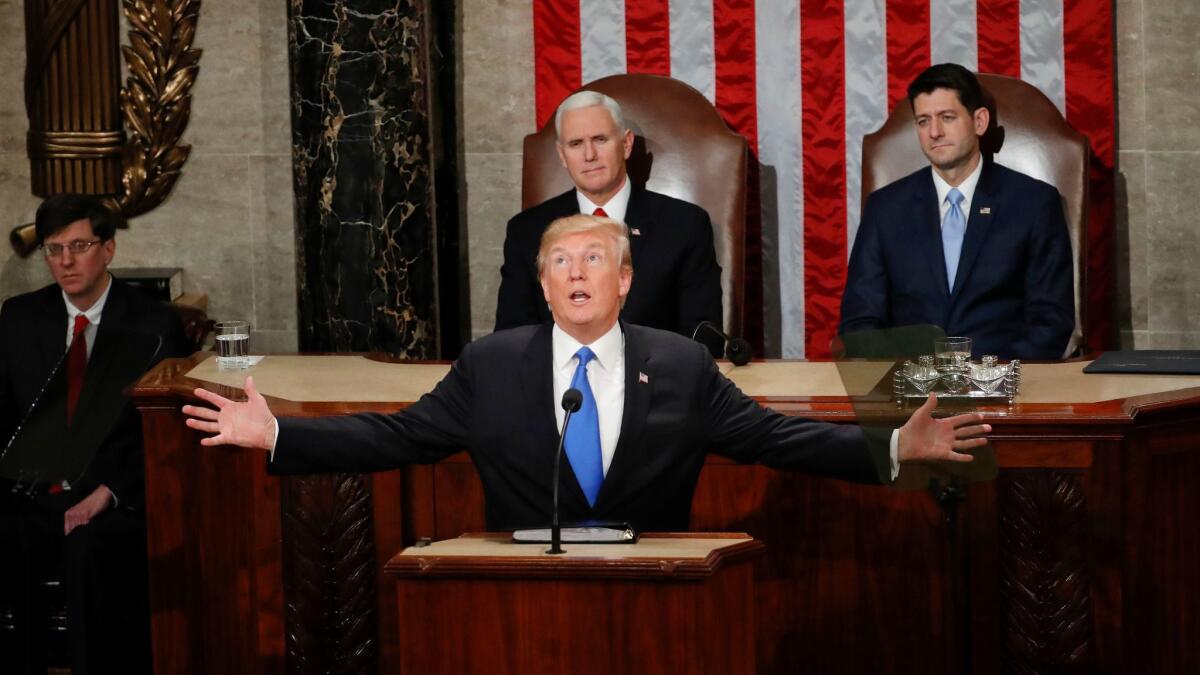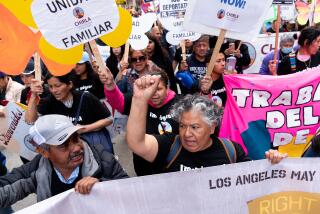Editorial: Can Dems trust Trump’s calls for bipartisanship? Probably not. But they can try to force his hand

President Trump has proved all too often that his word is not to be trusted. He makes promises then reneges, seems to agree to deals but then abruptly changes his mind, holds out hope for the so-called Dreamers and then dashes it against the rocks of anti-immigration orthodoxy.
But ever-optimistic that an old dog can learn a new trick, we took a close look at Trump’s first State of the Union speech Tuesday night and found a smattering of proposals that would be good for the nation. Is it foolish to think he was serious? Or that a private consult with nationalist senior advisor Stephen Miller won’t change his mind? Who knows, but it’s certainly worth trying to enact them.
Let’s start with paid family leave. Prodded by daughter Ivanka, Trump included six weeks of paid maternity leave in his campaign platform, and expanded it to include new fathers as well as mothers in his proposed budget. The proposal — which relied on states making family leave part of their unemployment insurance programs, funded by a tax on employers — appeared to get no further attention from Trump until Tuesday’s speech, when the president touted it again. He could easily find Democratic support to translate the rhetoric into policy.
The president also said he wants Congress to draft a bill “that generates at least $1.5 trillion” for new infrastructure (up from the $1 trillion investment he campaigned on). But he offered no specifics on what he wants built beyond “gleaming new roads, bridges, highways, railways and waterways,” and only a vague suggestion for how to pay for it. He called for combining federal money with state and local resources, something that already is routinely done. He also floated — again — the idea of leveraging private investment.
There’s a lot of room for skepticism about Trump’s infrastructure ambitions; his aim could be to shift infrastructure costs to state and local governments and to give sweetheart deals to private business with taxpayers carrying the risk. All the same, investing more in infrastructure has support across the two major parties, so surely something can move forward.
Trump also pushed for more job training programs and vocational schools — good ideas, although they come with a fraught history. A reinvention might be called for, but it must address the persistent problem that such programs train workers in skills that quickly become outdated in a technology-heavy economy, or that don’t match hiring needs where they are located.
Investing more in infrastructure has support across the two major parties, so surely something can move forward.
Similarly, the president endorsed prison reform “to help former inmates who have served their time get a second chance at life.” That’s a good idea too, but Trump gave no clues about what shape the reform would take. Nor are all members of the administration rowing the same direction on this issue. Atty. Gen. Jeff Sessions already has moved to undo Obama-era reforms in sentencing, seeking to lengthen prison terms — effectively making it harder for less-serious offenders to reenter society successfully. But more humane and practical approaches to sentencing, better reentry programs and other smart-on-crime changes to the justice system have strong support from Democrats and Republicans alike — well, except for Sessions.
Trump’s call to protect “citizens of every background, color, religion and creed” is a bipartisan interest as well, though the president framed it too narrowly. The government has a responsibility to protect everyone in the country, regardless of status. Leaving aside those living here illegally, does the president not believe he has a responsibility to protect tourists, green card holders or foreign students? The government does not protect minority communities by rolling back federal oversight of misbehaving police departments, which is what Sessions is doing. Trump can work with Democrats to reinstate oversight where needed.
Finally, Trump pledged again to bring down the cost of prescription drugs, an item high on the wish list of voters across the political spectrum. But while candidate Trump called for allowing Americans to import more of their prescription medicines from cheaper foreign suppliers, President Trump has focused mainly on such free-market solutions as cutting the cost of new drug approvals and speeding the availability of generic versions of costly brand-name drugs. His speech Tuesday didn’t say how Trump would fix “the injustice of high drug prices,” so there’s no telling whether he actually has a plan and, if so, it’s one Democrats could embrace. In fact, the president had little concrete to offer about almost everything on the agenda he laid out that night. But Democrats should try to force his hand regardless.
UPDATES:
2:37 p.m.: This editorial was re-edited for clarity.
More to Read
A cure for the common opinion
Get thought-provoking perspectives with our weekly newsletter.
You may occasionally receive promotional content from the Los Angeles Times.






